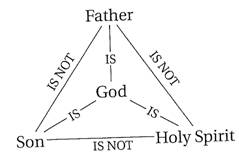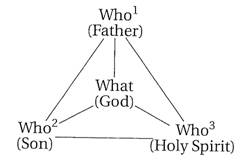Wayne Grudem’s Systematic Theology defines the Trinity as follows: “God eternally exists as three persons, Father, Son, and Holy Spirit, and each person is fully God, and there is one God” (p. 226).
Broken down, this amounts to three propositions:
- God is three persons.
- Each person is fully God.
- There is one God.
In addition, it’s helpful to elaborate on the fact that when we say “God is three persons,” we mean that he is not just one person, and that the persons of the Trinity are not to be confused. So we can also say:
- The Father is God.
- The Son is God.
- The Holy Spirit is God.
- The Father is not the Holy Spirit, and the Holy Spirit is not the Father.
- The Holy Spirit is not the Son, and the Son is not the Holy Spirit.
- The Son is not the Father, and the Father is not the Son.
If your head is starting to spin—then perhaps this little diagram can help give you a snapshot of what we’ve been saying:

Theologians have typically described God as being of “one essence” but “three persons.” But what exactly do we mean by “essence” and “person”? In its simplest terms, essence answers the question, “What are you?” Person answers the question, “Who are you?”
So when we say that the Trinity entails “one essence” (God) and “three persons” (Father, Son, and Spirit), we are saying that the Trinity has one What and three Who’s. We can draw this as follows:

For an excellent collection of resources for further study on the Trinity, see the Theopedia entry.
Bruce Ware has written an excellent book entitled, Father, Son, and Holy Spirit: Relationships, Roles, and Relevance. This book can be read in conjunction with Dr. Ware’s lectures delivered at the 2005 Desiring God Conference for Pastors, "This is My Beloved Son": Exulting in the Trinitarian Relationships of Jesus Christ. Here are links to the talks and outlines:
- The Trinity of Persons: Unity and Distinction, Equality and Differentiation (MP3), (PDF)
- Jesus and the Father: Love and Obedience, Authority and Submission (MP3), (PDF)
- Jesus and the Spirit: Trust and Reliance, Exaltation and Glorification (MP3), (PDF)
No comments:
Post a Comment